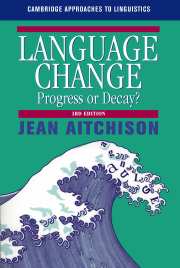Book contents
16 - Language death
How languages end
from Part 4 - Beginnings and endings
Summary
I am always sorry when any language is lost, because languages are the pedigree of nations.
Samuel Johnson, Letter to BoswellIn the nineteenth century, scholars frequently talked about languages as if they were organic entities, like plants, which went through a predictable life cycle of birth, infancy, maturation, then gradual decay and death. In 1827, the German scholar Franz Bopp claimed that ‘Languages are to be considered organic natural bodies, which are formed according to fixed laws, develop as possessing an inner principle of life, and gradually die out because they do not understand themselves any longer, and therefore cast off or mutilate their members or forms.’
Nowadays, we no longer have this simple belief that languages behave like beans or chrysanthemums, living out their allotted life, and fading away in due course. It is, however, a fact that languages sometimes die out. This is the process which we shall be discussing in this chapter.
Note that when we talk about languages dying, we are not referring to languages which gradually alter their form over the centuries, and in so doing possibly change their names. Latin, for example, is sometimes spoken of as a ‘dead’ language, because nobody today speaks it. But it did not really die, it merely changed its appearance and name, since French, Spanish, Italian and Sardinian are all direct descendants of Latin and are in a sense the same language.
- Type
- Chapter
- Information
- Language ChangeProgress or Decay?, pp. 235 - 248Publisher: Cambridge University PressPrint publication year: 2000

